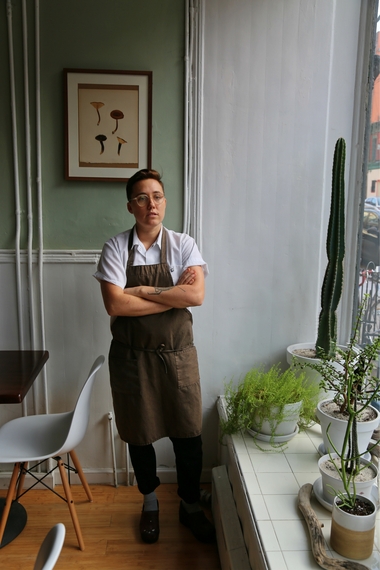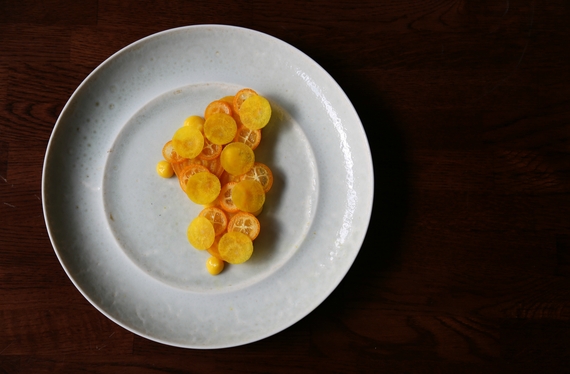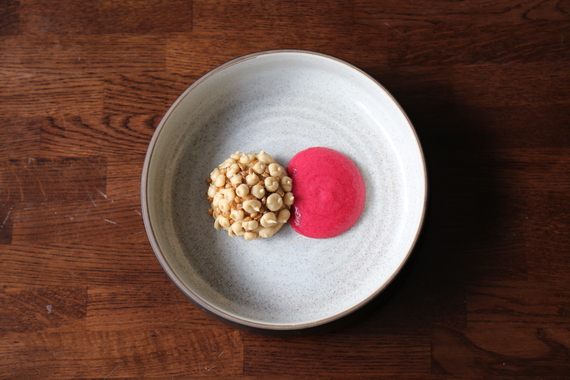 After a meteoric rise this past year and countless accolades including a very warm review from The New York Times and a Michelin star, Take Root's Elise Kornack is taking the restaurant business by storm.
After a meteoric rise this past year and countless accolades including a very warm review from The New York Times and a Michelin star, Take Root's Elise Kornack is taking the restaurant business by storm.
Her new age approach to farm-to-table foods have exposed diners to combinations of local ingredients that haven't been experienced before in the New York City food scene. Trying to find another hotspot that's able to replicate the intimate setting of Kornack's restaurant is quite a difficult task -- if not near impossible.
Kornack sat down with us to discuss her thoughts on the current NYC food scene, the future of Take Root and the importance of recognizing more female and LGBT chefs.
You've worked at both Aquavit and The Spotted Pig -- when did you feel your food was actually representative of you?
Relatively speaking -- I'm only 28 so I'm still a spring chicken, that's for sure -- but we've been open for two years and that's kind of when I entered the game in a way that's really representative of my own cuisine versus behind another chef.
I mean any working experience is a learning experience, especially in the culinary industry. There's really no way not to learn something new every day, whether it be about personal relationships or [laughs] technique. Something's to be learned inside the restaurant. Absolutely.
So, what is that like to get a Michelin star after two years? That must be pretty crazy.
Yeah, I mean crazy I guess doesn't even begin to explain the feeling, though I haven't really come up with a word that does yet. So I'll take crazy for now. It's totally insane, really. I mean on every level there's so much excitement and so much satisfaction, but there's also an element of pressure and stress that comes with it -- or, not even stress more so responsibility. I just feel like you have people coming from not only just Brooklyn or New York but also from other places in this country or other countries to see you or your food and you want to make sure that you live up to the expectation that somehow they have set before coming. So it's important that you continue to keep your head down and stay focused regardless of the wonderful accolade.
Is that how you do it?
I am pretty much - I'm very shy in one respect. I don't talk easily about my successes which is, I don't think, every atypical of chefs. A lot of chefs are a little bit quieter about things that they accomplish because it's kind of like a quiet victory. You know, you're in the kitchen all day working really hard and when you get those things it's kind of like a little fist-pump-to-yourself type of thing. Like, "All right. Cool. It's worth it." I'm not just wasting all of the hours of my life.
Talk to me about when you first opened the restaurant -- what the intention was.
My wife and I kind of wanted to do a joint venture. At the time we met and were engaged we weren't seeing each other at all and we kind of wanted to change that. So the initial intention with opening a place of our own was to work together and see each other and kind of challenge ourselves to say, "Is it possible to be a chef in New York City and own a successful restaurant but also have a life?" Because the only life I knew was possible was to only have the restaurant be your life and I wanted more than that, you know? I wanted to garden, I wanted to spend time with my family. So we set out to kind of at first do something that could allow us to have that kind of life; and then secondly we wanted to - I wanted a place where I could showcase whatever creativity I was working on versus executing another chef's creative vision. So we figured a space like Take Root with only twelve seats and only open a certain number of times a week; that way we would have all the time the rest of the week to kind of really be adventurous with what we wanted to do and pour all of ourselves into everything. So that was the original intention and it has come to fruition, no doubt. So we're really excited about it in that way.
Do you think part of the success has been in limiting the capacity of the restaurant?
Oh I think it's been a tremendous impact on the success of the restaurant. Not necessarily in the most obvious of ways. One of the most obvious ways is that it takes significantly longer for word to spread when you're only serving 36 people a week. So the downfall can be that it took two years for Adam Platt to come in or for Michelin to come in or for New York magazine. So it took a lot longer because word doesn't spread as fast and there's a lot of restaurants opening and there's priority among the critics or local food bloggers or even the diners to go check out those newer places; and if it's hard to get into a place it kind of falls by the wayside. But the benefit really was that we got to grow organically over time and kind of master the craft that we have here versus -- I wouldn't say actually master, but get better at the craft we are doing -- because we didn't have critics and diners down our throats ready to judge our every move after two months of opening. So I think the success that we had is very much a part of the fact that it took us longer to spread the word and less people can come in and it's harder to get in and therefore both the positive and the negative were not able to grow as quickly and affect the long term success of the business.
So many people have said, "This is a really fantastic restaurant." Do you want to expand? Are you talking to people? Do you say, "Maybe I'll hire a third person?"
We have no intention in hiring anybody with Take Root in this current state. There's no, well to start, there's no reason to. We've accomplished everything we have just the two of us and that is part of what it is to dine at Take Root. We set out to do something that had never been done, that people cannot have, replicate the experience, anywhere else and we did just that. I mean you cannot have this Take Root experience anywhere else. You can dine at another twelve-seat tasting menu restaurant if you go to Blanca or you could go to Luksus and have a tasting menu as well but you're not gonna have myself or my wife there and that's a very big portion of the dining experience; us interacting with the people. So the idea of hiring somebody, it crossed our minds at certain points throughout the development of Take Root but at this point we have no interest. We will definitely be thinking about a second project some time soon. I can't say where or when that will happen but we don't think that we're going to really expand this current project. First off, the actual physical space won't allow for it. We don't have any access to any other closets or storage or any other ways to physically expand. So whatever happens next probably won't be in this exact location.
I know you can't tell me any super details, but would it be tasting-menu-type food, do you think?
I think I can speak for myself as a chef less than the actual whatever-the-next-project is and more so, yeah I think this way of dining is kind of best fit for my cuisine. I don't know that it would ever be exclusively that. I think something that I'm finding, that we're both finding with the tasting menu only experience, is that you're limited to how many people can kind of experience what you're doing. Both the price point, length of time, difficulty of getting a reservation; and we never set out to be an inaccessible restaurant or have any sense of pretension. This is just really all we could do in this space, as it was originally a temporary idea and has kind of made itself permanent. So whatever we do next we will have an element of something that's accessible to the everyday person and not necessarily only the people who want to commit to kind of a new age tasting menu.
I heard the wait for the restaurant's about three months to get in...
Well we only release reservations 30 days prior. So technically it's only a month wait. But what people have found is that it takes about three months, if you're not really on top of it and you don't know exactly what date you want, to kind of decide that you're going to take that date, have that 30 days and then kind of get up at midnight that night to do it. So there are tricks to the trade and I will say whoever is listening and is interested the wait list is definitely the place to be. People make reservations 30 days out with tons of excitement and then a week or two go by and they have to go away for business or they couldn't secure a babysitter and what not and they cancel and the first place we look is to our wait list. I see people come off the wait list on a daily basis so that's definitely the place to be if you'd like to get into Take Root, for sure.
I talked to April Bloomfield and Lidia Bastianich, and a lot of female chefs in the business who are happy seeing that the industry is starting to recognize more women chefs. There are also a lot of LGBT chefs that we haven't recognized yet. Could you speak to having both of those perspectives?
I think the first kind of reaction I have to that question is that it is very much present. I actually have never really experienced it inside the restaurant; as in as an employee in another restaurant, an employee in the kitchen or with other kitchen staff or restaurant staff. I would say that kind of it's more prevalent, or at least we notice it more so, in a guest to restaurant owner experience. I think in 2015 now, gay women or female chefs are very widely accepted. I know that they are as much in the media but I think everyone knows that [laughs] female chefs exist and that they can be successful. So on that token things have kind of been established. But I think when people come in not everybody knows that we're married, not everybody knows how young we are, that we're women or that we're gay and kind of all of those things coming together; for some people you can kind of watch it calculate in their brain and not that there's an uncomfortable feeling but you can definitely tell that there are certain people who kind of may have a different reaction if I was a bearded, tattooed Brooklyn guy and Anna was my wife. Not necessarily negative, but different definitely and we're very much aware of that and we kind of dictate ourselves in a very professional manner when we're here so that there isn't any uncomfortability. But the only time we really notice it is during service, not very much on a worldly basis.
For anyone who goes into the restaurant, who wants to experience what you have done -- what do you hope they take away?
I hope their mind is just a tiny bit more open when they leave, in the idea that respectively regarding the culinary industry. In that there's so many different kinds of restaurants and that word "restaurant" can be defined in so many different ways with so many different hours of operation and price points and culinary points of view; and I think that Take Root has been kind of a success story not just for us but for a lot of other people who hope to do something similar or didn't know that it was possible and I think that that was kind of the greatest join in getting the Michelin star and saying, "This can totally be done." You can have a life, you can have a wonderful restaurant, you can execute your vision on a small scale with not a lot of money kind of in an offshoot street of a neighborhood in Brooklyn. Those things are possible. So I think that was - that's what we hope people take away, is that this is just one piece of the future culinary puzzle which will be I think filled with all sorts of little micro-restaurants and people kind of fulfilling their dreams.

